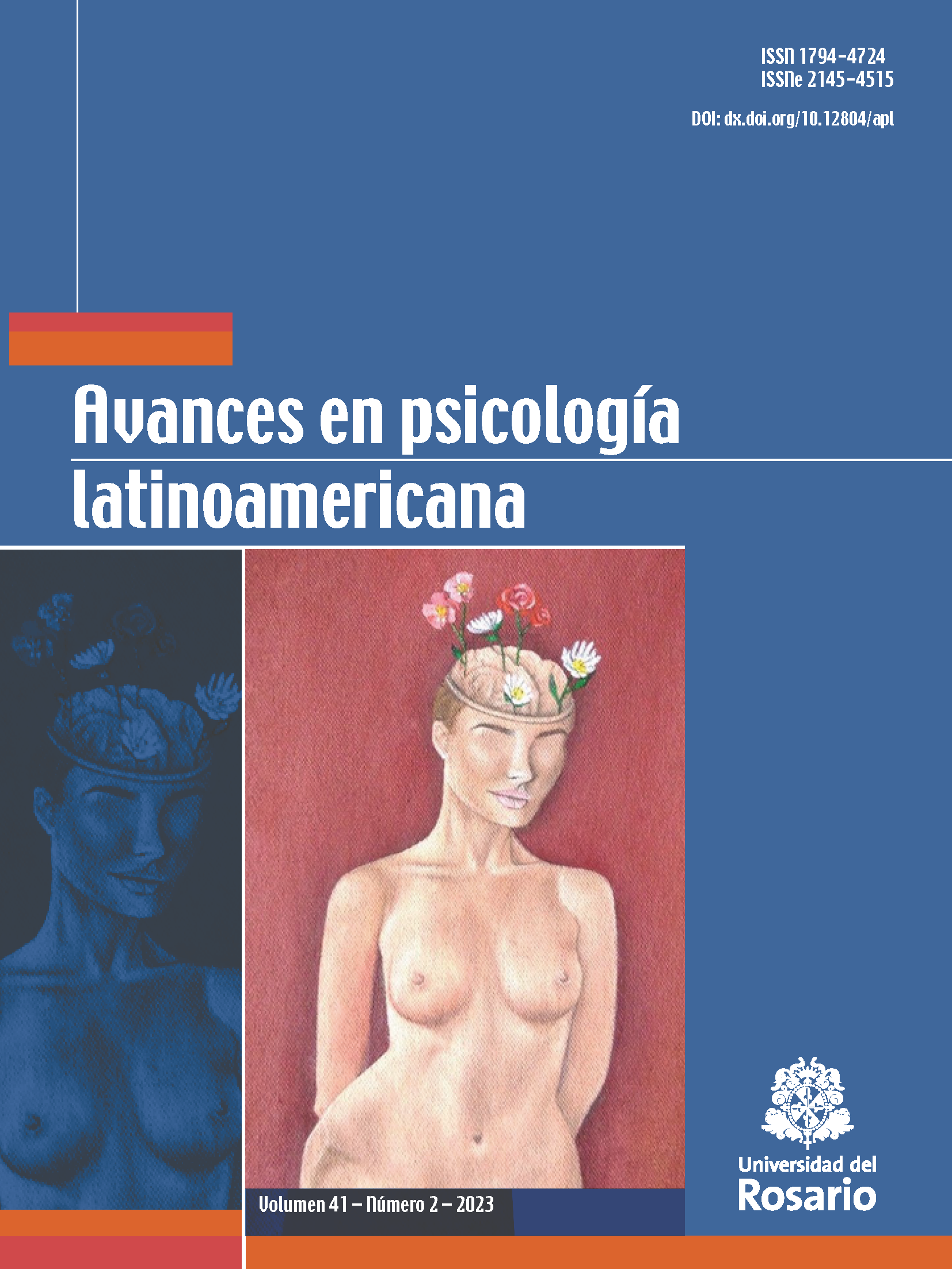Factores laborales, actitudes de género y bienestar asociados al conflicto trabajo y familia en Chile
Barra lateral del artículo
Contenido principal del artículo
La incidencia de factores y actitudes de género y el Estado de bienestar en el conflicto trabajo y familia ha sido abordado a nivel internacional, pero sin evidencia en Chile. Este estudio analizó cómo afectan distintos factores sociolaborales, el tradicionalismo de género y las actitudes hacia el Estado de bienestar en el conflicto trabajo/familia, en una muestra de 550 trabajadores con hijos menores de 14 años, residentes en Santiago de Chile. Se aplicó un análisis de regresión logística para determinar las variables predictoras del conflicto trabajo/familia, del conflicto trabajo a familia y del conflicto familia a trabajo. Los resultados muestran que las dificultades para conciliar en la empresa y el tradicionalismo de género influyen positivamente en el conflicto trabajo/familia. Además, el ingreso mínimo influye en el conflicto trabajo/familia; mientras que el tiempo de cuidado incide en el conflicto familia a trabajo y las horas fuera de casa en el conflicto trabajo a familia.
Descargas
Annor, F. (2016). Work-family conflict: A Synthesis of the research from cross-national perspective. Journal of Social Sciences, 12(1), 1-13. https://doi.org/10.3844/jssp.2016.1.13
Badawy, P., & Schieman, S. (2019). When family calls: How gender, money, and care shape the relationship between damily contact and family-to-work conflict. Journal of Family Issues, 41(8), 1188-1213. https://doi.org/10.1177/0192513X19888769
Bryman, A. (2016). Social research methods. Oxford University Press.
Bergh, J. (2006). Gender attitudes and modernization processes. International Journal of Public Opinion Research, 19(1), 5-23 https://doi.org/10.1093/ijpor/edl004
Cadena, M. E., Burgaleta, E., Andrade, S., López, M., Gómez, A., & Merino, P. (2020). Conflicto empleo-familia y autopercepción de la saud desde una perspectiva de género. Saúde e Sociedade, 29(2). https://doi.org/10.1590/S0104-12902020190033
Calzada, I., Gómez-Garrido, M., Moreno, L., & Moreno, F. J. (2013). Regímenes de bienestar y valores en Europa. Revista Española de Investigaciones Sociológicas (REIS), 141(1), 61-90. https://doi.org/10.5477/cis/reis.141.61
Carlson, D., Kacmar, M., & Williams, L. (2000). Construction and initial validation of a multidimensional measure of work-family conflict. Journal of Vocational Behavior, 56(2), 249-276. https://doi.org/10.1006/jvbe.1999.1713
Cea D’Ancona, M., Á. (2002). Análisis multivariable. Teoría y práctica en la investigación social. Síntesis.
Council of Europe. (2009). Family Policy in Council of Europe member states. Council of Europe. https://www.leavenetwork.org/fileadmin/user_upload/k_leavenetwork/Family_Policy_in_Council_of_Europe_member_states_en.pdf
Davis, S. (2020). The work-family interface in a gendered cultural context: Cross-national analysis of work stress. International Journal of Cross Cultural Management, 20(1), 53-69. https://doi.org/10.1177/1470595820904111
DeMaris, A. (1995). A tutorial in logistic regression. Journal of Marriage and Family, 57(4), 956-968. https://doi.org/10.2307/353415
Encuesta Social Europea. (2017). Encuesta Social Europea (8.a ed.). Centro de Investigaciones Sociológicas.
European Social Survey. (2008). Round 4 Module – Draft Questionnaire version 3. Centre for Comparative Social Surveys, City University London.
European Social Survey. (2011). Round 5 Module on Work, Family and well-being - Draft Questionnaire version 1. London, UK: Centre for Comparative Social Surveys, City University London.
European Social Survey. (2011). Round 5: Work, Family y well-being - Question Design Template Draft 4. London, UK: Centre for Comparative Social Surveys, City University London.
European Union. (2015). Special Eurobarometer 428 "Gender Equality". European Commission. https://data.europa.eu/doi/10.2838/858447
EUSTAT. (2010). Encuesta sobre la conciliación de la vida laboral, familiar y personal. Instituto Vasco de Estadística. https://www.eustat.eus/document/datos/cuestionarios/cues_cvl10_c.pdf
Flaquer, L., Pfau-Effinger, B., & Artiaga, A. (2014). El trabajo familiar de cuidado en el marco del Estado de bienestar. Cuadernos de Relaciones Laborales, 32(1), 11-32. https://revistas.ucm.es/index.php/CRLA/article/view/44867
Ford, M. (2011). Linking household income and work–family conflict: A moderated mediation study. Stress and Health, 27(2), 144-162. https://doi.org/10.1002/smi.1328
Frías, S. (2020). Tensiones y conflictos entre roles y responsabilidades en distintas esferas de la vida. El caso de una institución de la administración pública federal mexicana. Revista Interdisciplinaria de Estudios de Género de El Colegio de México, 6. https://doi.org/10.24201/reg.v6i0.390
Frone, M. (2003). Work-family balance. En J. Quick & L. Tetrick (Eds.), Handbook of occupational health psychology (pp. 143-162). American Psychological Association. https://psycnet.apa.org/doi/10.1037/10474-007
Gabini, S. (2019). Revisando el constructo articulación trabajo-familia: entre el conflicto y el enriquecimiento. Psicogente, 22(42), 14-39. https://doi.org/10.17081/psico.22.42.3470
Gallie, D., & Russell, H. (2009). Work-family conflict and working conditions in Western Europe. Social Indicators Research, 93, 445-467. https://doi.org/10.1007/s11205-008-9435-0
Greenhaus, J., & Beutell, N. (1985). Sources of conflict between work and family roles. The Academy of Managment Review, 10(1), 76-88. https://doi.org/10.2307/258214
Greenhaus, J., Collins, K., & Shaw, J. (2003). The relation between work-family balance and quality of life. Journal of Vocational Behavior, 63(3), 510-531. https://doi.org/10.1016/S0001-8791(02)00042-8
Hagqvist, E., Gillander, K., & Nordenmark, M. (2016). Work-family conflict and well-being across Europe: The role of gender context. Social Indicators Research, 132(2), 785-797. http://link.springer.com/article/10.1007/s11205-016-1301-x
Hair, J. F., Black, W. C., Babin, B. J., & Anderson, R. E. (2014). Multivariate Data Analysis. Pearson Education Limited.
Hegewisch, A., & Gornick, J. (2011). The impact of work-family policies on women’s employment: A review of research from OECD countries. Community, Work & Family, 14(2), 119-138. https://doi.org/10.1080/13668803.2011.571395
Herrera, R., Duncan, P., Green, M., & Skaggs, S. (2012). The effect of gender on leadership and culture. Global Business and Organizational Excellence, 31(2), 37-48. https://doi.org/10.1002/joe.21413
Hochschild, A. (1989). The second shift: Working families and the revolution. Penguin Books.
Jiménez, A., Bravo, C., & Toledo, B. (2020). Conflicto trabajo-familia, satisfacción laboral y calidad de vida laboral en trabajadores de salud pública de Chile. Revista de Investigación Psicológica, (23), 67-85. http://www.scielo.org.bo/scielo.php?pid=S2223-30322020000100006&script=sci_arttext
Jiménez, A., Mendiburo, N., & Olmedo, P. (2011). Satisfacción familiar, apoyo familiar y conflicto trabajo-familia en una muestra de trabajadores chilenos. Avances en Psicología Latinoamericana, 29(2), 317-329. http://www.scielo.org.co/scielo.php?pid=S1794-47242011000200011&script=sci_abstract&tlng=pt
Keene, J., & Quadagno, J. (2004). Predictors of pereived work-family balance: Gender difference or gender similarity? Sociological Perspectives, 47(1), 1-23. https://doi.org/10.1525%2Fsop.2004.47.1.1
König, S., & Cesinger, B. (2015). Gendered work-family conflict in Germany: Do self-employment and flexibility matter? Work, Employment and Society, 29(4), 531-549. https://doi.org/10.1177%2F0950017014545264
McGinnity, F., & Calvert, E. (2008). Work-life conflict and social class in Western Europe. Social Indicators Research, 93, 489-508. http://dx.doi.org/10.1007/s11205-008-9433-2
McGinnity, F., & Russell, H. (2013). Work-family conflict and economic change. En D. Gallie (Ed.), Economic crisis, quality of work and social integration: The European experience (pp. 201-231). Oxford University Press. http://dx.doi.org/10.1093/acprof:oso/9780199664719.003.0007
McGinnity, F., & Whelan, C. (2009). Comparing work-life conflict in Europe: Evidence from the European social survey. Social Indicators Research, 93, 433-444. https://psycnet.apa.org/doi/10.1007/s11205-008-9437-y
Oorschot, V. W., & Gugushvili, D. (2019). Retrenched, but still desired? Perceptions regarding the social legitimacy of the welfare state in Russia compared with EU countries. Europe-Asia Studies, 71(3), 354-364. https://doi.org/10.1080/09668136.2019.1583316
Oorschot, V. W. (2010). Public perceptions of the economic, moral, social and migration consequences of the welfare state: An empirical analysis of welfare state legitimacy. Journal of European Social Policy, 20(1), 19-31. https://doi.org/10.1177%2F0958928709352538
Ortega, A., Rodríguez, D., & Jiménez, A. (2013). Equilibrio trabajo-familia: corresponsabilidad familiar y autoeficacia parental en trabajadores de una empresa chilena. Diversitas: Perspectivas en Psicología, 9(1), 55-64. http://www.scielo.org.co/scielo.php?script=sci_arttext&pid=S1794-99982013000100005
Peng, Y., Jex, S., Zhang, W., Ma, J., & Matthews, R. (2020). Eldercare demands and time theft: Integrating family-to-work conflict and spillover-crossover perspectives. Journal of Business and Psychology, 35, 45-58. https://doi.org/10.1007/s10869-019-09620-3
Russell, H., O´Connell, P., & McGinnity, F. (2009). The impact of flexible working arrangements on work–life conflict and work pressure in Ireland. Gender, Work & Organization, 16(1), 73-97. https://doi.org/10.1111/j.1468-0432.2008.00431.x
Soboleva, N. (2019). Gender attitudes and achievement motivation across Europe (The evidence of ESS Data). Higher School of Economics Research Paper No. WP BRP, 88. https://dx.doi.org/10.2139/ssrn.3471863
Steiber, N. (2009). Reported levels of time-based and strain-based conflict between work and family roles in Europe: A multilevel approach. Social Indicators Research, 93, 469-488. https://doi.org/10.1007/s11205-008-9436-z
Svallfors, S. (2012). Welfare states and welfare attitudes. En S. Svallfors (Ed.), Contested welfare states. Welfare attitudes in europe and beyond. Stanford University Press. https://doi.org/10.2307/j.ctvqsdrs4
Svallfors, S., Kulin, J., & Schnabel, A. (2012). Age, Class, and attitudes toward government responsibilities. En S. Svallfors (Ed.), Contested welfare states. welfare attitudes in Europe and beyond. Stanford USA Stanford University. Press.https://doi.org/10.2307/j.ctvqsdrs4
Tereškinas, A. (2010). Between the egalitarian and neotraditional family: Gender attitudes and values in contemporary Lithuania. Kultūra ir Visuomenė: Socialinių Tyrimų Žurnalas, 1(1), 63-81. https://www.ceeol.com/search/article-detail?id=109903
Torres, A., Coelho, B., Cardoso, I., & Brites, R. (2012). A mysterious European threesome: Workcare regimes, policies and gender. International and Multidisciplinary Journal of Social Sciences, 1(1), 31-61. http://dx.doi.org/10.4471/rimcis.2012.02
Vera-Calzaretta, A., Carrasco-Dájer, C., Da Costa, S., & Páez-Rovira, D. (2015). Factores psicosociales del presentismo en trabajadores del sistema de Salud chileno. Journal of Work and Organizational Psychology, 31(2), 119-128. https://scielo.isciii.es/pdf/rpto/v31n2/v31n2a07.pdf
Voydanoff, P. (2005). Work demands and work-to-family and family-to-work conflict: Direct and indirect relationships. Journal of Family Issues, 26(6), 707-726. https://doi.org/10.1177%2F0192513X05277516
Wierda-Boer, H., Gerris, J., Vermulst, A., Malinen, K., & Anderson, K. (2009). Combination strategies and work-family interference among dual-earner couples in Finland, Germany, and the Netherlands. Community, Work & Family, 12(2), 233-249. https://doi.org/10.1080/13668800902778991
Wilson, J., & Joye, S. (2016). Research methods and statistics: An integrated approach. Sage.
Detalles del artículo

Esta obra está bajo una licencia internacional Creative Commons Atribución-NoComercial 4.0.
Los autores conservan los derechos de autor y garantizan a la revista el derecho de ser la primera publicación del trabajo al igual que licenciado bajo una Creative Commons Attribution License que permite a otros compartir el trabajo con un reconocimiento de la autoría del trabajo y la publicación inicial en esta revista.








